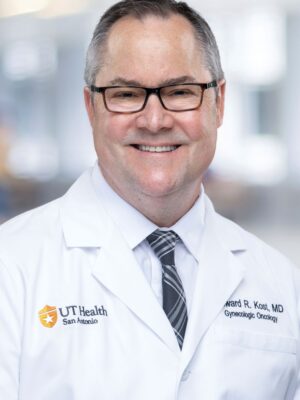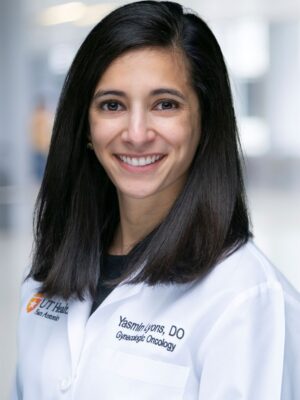Program
Our Gynecologic Oncology fellowship program provides for an outstanding academic environment for training the next generation of academic Gynecologic Oncology specialists.
Clinical
The first year of fellowship in gynecologic oncology consists of research and the subsequent two years will be spent in clinical gynecologic oncology, under the guidance of the three faculty members who have appointments at the UT Health San Antonio Joe and Teresa Lozano Long School of Medicine. Each faculty member rotates as an attending for the Gynecologic Oncology service.
The clinical team consists of the two clinical fellows (senior and junior fellows), one fourth-year resident, one second-year resident and one first-year resident. Several third- and fourth-year medical students rotate on the clinical team as well. Each faculty member is always ready to assist the fellow in obtaining the knowledge, skill and capability to manage all gynecologic oncology patients.
The fellow’s inpatient rotations will include all surgeries related to gynecologic malignancies, as well as difficult pelvic surgeries not related to cancer diagnoses. The fellow will participate in all surgical procedures in the categories defined by the American Board of Obstetrics and Gynecology, depending upon the type of surgery being performed, the level of the fellow’s proficiency, and the year of training. Periodic meetings with the program director will assure the fellows are obtaining adequate numbers and types of surgical cases to fulfill their training requirements.
The Gynecologic oncologists within the division are trained and perform intestinal and urologic surgery related to gynecologic malignancies and will train the fellows in such. However, to provide the fellow with a concentrated experience in complex intestinal surgeries, the fellow will rotate for 4 weeks on the Colorectal Surgery service.
The Gynecologic Oncology and the Colorectal Surgery services have a long tradition of excellent collegial patient care. The fellows will also participate in a four-week rotation in the Surgical Intensive Care Unit where they will have a rigorous experience in the care of seriously ill patients.
During the latter part of their senior year the fellows will have a four-week rotation on the radiation therapy service. During this rotation, fellows are required to attend didactic lectures in radiation physics and radiation biology and will have the opportunity to perform brachytherapy procedures. Fellows will also spend a four-week rotation on the Palliative Care service during their first clinical year.
During this rotation fellows are supervised by the Palliative Care Service faculty, all of whom have extensive clinical experience and board certification in Hospice and Palliative Medicine. Fellows are introduced to all aspects of Palliative Care and are expected to work together with all members of the Interdisciplinary Palliative Care Team.
Research
Fellows who are accepted into the program spend their first year in research. Fellows in their research year of training are paired with one of the full-time faculty in the medical center who will mentor them, along with the Gynecologic Oncology faculty, to ensure that their research produces publishable results. Faculty mentors may be part of the Department of Obstetrics or Gynecology or may be associated with one of many departments within the medical center.
The division actively participates in clinical research studies, including investigator-initiated studies, industry-sponsored studies as well as studies from national cooperative groups such as the Gynecologic Oncology Group and the Radiation Therapy Oncology Group (NRG Oncology). Our program strongly supports fellows who are interested in developing prospective clinical trials, as well as chart reviews, and there is a full-time research staff with extensive expertise to retrospective assist and mentor the fellows through the institutional approval process.
Didactic
Fellows are asked to take two graduate level courses during their research year. These courses are fully supported by the division. The trainee is also expected to attend several weekly seminars, conferences and lectures, given within the department, as well as the medical center. The fellow will be encouraged to attend regional or national scientific meetings which are pertinent to the field of gynecologic oncology, and funding is available for such meetings. Presentations at such meetings are strongly encouraged as well.
The gynecologic oncology fellow will also be responsible for giving several formal lectures within the Department of Ob/Gyn, as well as other departments. Student lectures will also be the responsibility of the fellow as scheduled. The second-year clinical fellow is responsible for the weekly Tumor Conference, held jointly with the Division of Radiation Oncology and the Department of Pathology. The research year fellows are responsible for choosing relevant and recent publications for the monthly journal club.
Fellowship Objectives
It is expected that each fellow will acquire the expertise to meet the following objectives:
- Gain the understanding, skill and capability to perform radical pelvic surgery independent of supervision.
- Manage intestinal, urologic and vascular problems caused by gynecologic malignancies or their treatments.
- Manage operative and post-operative care of patients with critical medical conditions and co-morbidities and handle non-operative management of associated conditions and disorders of the intestinal and urinary tract.
- Participate as a member of a team which plans and applies all forms of radiotherapy.
- Be able to evaluate patients with gynecologic malignancies, choose appropriate drugs, administer therapy and care for the toxic side effects of chemotherapy in these patients.
Fellowships

Edward R. Kost, MD
Professor
Program Director

Yasmin Lyons, DO
Assistant Professor
Associate Program Director

Patricia D. Gutierrez
Program Coordinator – Senior
